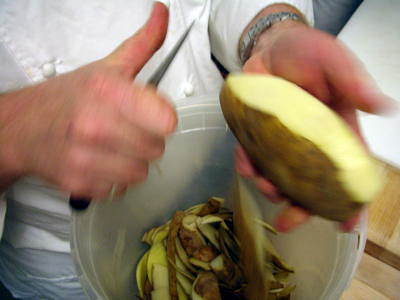Like many restaurants, Oliveto owns a number of cleavers, cheese knives and other specialty tools shared by all kitchen employees. But chefs and interns are expected to have their own personal knives. Most wouldn't want it any other way.
Chefs tend to be picky about how their blades are used, sharpened and stored. If all knives were used communally in a kitchen, the skirmishes would be epic. Fights would break out -- knife fights.
To examine the options, Canales graciously allowed me to try out the personal knives that he and other Oliveto chefs were using. In one afternoon, I was able to handle and slice food with a few dozen blades, while picking up tips on knife shops and Web sites.
Here are the knives I purchased that week, along with a few others I've since added to my collection:
Fujitake 10 1/2 inch chef knife
This knife is a wonder of Japanese forging. It is light, well-balanced, amazingly thin, strong and very, very sharp. It is made with VG-10, a combination of steel, cobalt and other elements. The cobalt helps the steel keep its edge.
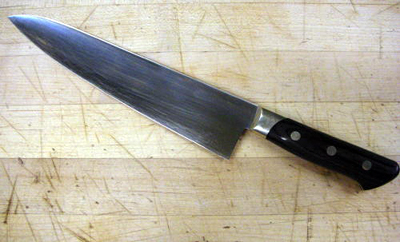
Two of the chefs at Oliveto own Fujitakes, and after I worked with one, I was immediately seduced. I headed straight to Hida Tool in Berkeley and purchased one.
From what I've read, Hida is the only U.S. importer of Fujitake ware. At $159, this big chef's knife is not cheap, but it is amazingly versatile.
Sabatier Canadian Massif 7 1/4 inch slicer
I wanted at least one classic French knife in my collection, and this is the one I chose. These Canadian Massif knifes are made in Thiers, the legendary French forging town that is the reputed home of the guillotine. These knives are made from historic blanks (chunks of steel), and are collector's items. They were originally sold to the Canadian market, hence the name.
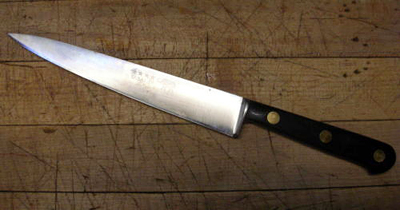
This is an old school knife -- made of carbon steel, not stainless steel. To prevent rusting, it must be kept dry, which makes it a poor choice for home use. But carbon steel is easier to sharpen and keep sharp than stainless steel. That's why many professional chefs, including Canales, prefer it for everyday restaurant use.
I pull out this knife for cleaning and cutting squid, filleting fish, slicing the skin off of grapefruits and oranges and other tasks. I purchased it for $74.95 at The Best Things, an online shop that offers one of the Web's best selections of historic French, German and Japanese knives.
Shun 4-inch paring knife
Yikes. This thing is sharp. It also is beautiful, with a black Pakkawood handle capped in stainless steel, and a wavy pattern on the blade known as "Damascus."
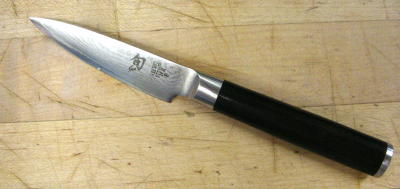
These knives were designed by Seattle bladesmith Bob Kramer, whose innovations in forging were chronicled last November in a New Yorker profile.
Sur La Table commissioned Kramer to design a special set of Damascus knives, made in Japan under the "Shun" label.
If you have small hands, you might prefer a paring knife with a shorter handle. But the Shun works for me, and I use it daily, mainly for paring onions and garlic. You can find this wicked blade at Sur La Table and various web sites, selling for roughly $65.
Dexter Russell semi-stiff 6-inch boning knife
This U.S. manufacturer of commercial cutlery is known for its boning knives, and you can purchase them with any number of handles and forgings, with a resulting range of prices. I bought the basic model, for $16.50. So far, it has been effective in boning and trimming chicken, fish, pork and other meats.

Victorinox bird's beak paring knife
A bird's beak is handy for small, technical jobs, like trimming baby artichokes. Thus I added this to my collection. This knife costs less than $10, and with a basic nylon handle, you can find them for as cheap as $5.
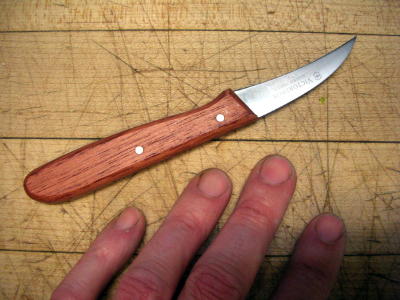
Edge Pro 12-inch ceramic honer
If you are serious about knives, you need a sharpening stone, and you need to learn how to use it. Yet if you are doing a lot cutting, a ceramic honer will help keep your knives sharp in between sessions with the stone.
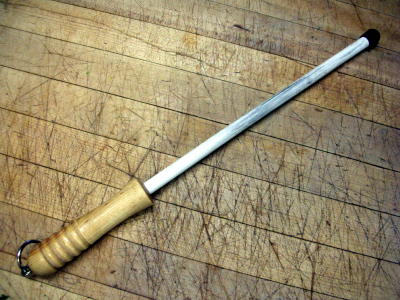
Several chefs at Oliveto swear by this honing wand made by Edge Pro, a company in Hood Hood River, Oregon, because it sharpens without taking as away metal as a sharpening steel. The ceramic honer is especial protective of thin-edged Japanese knives, which can be ruined by use, and misuse, of a sharpening steel.
This honer costs $30. You can find it at Edge Pro's website.
That's my small knife kit, such as it is. But as my wife likes to say, I am a "gear head." So my collection is sure to expand. How about you? Do you have a particular knife, or collection of knives, that you consider to be extraordinary?
